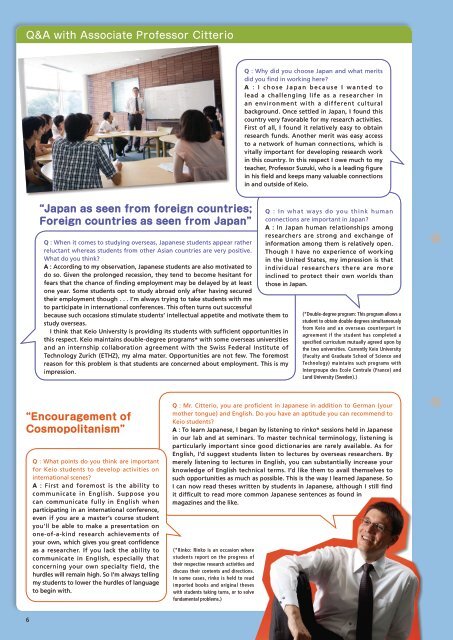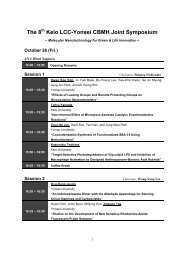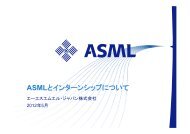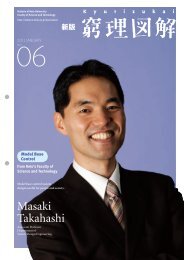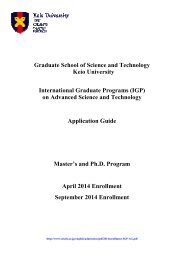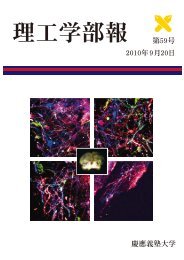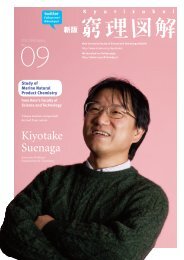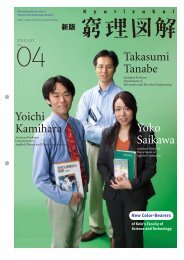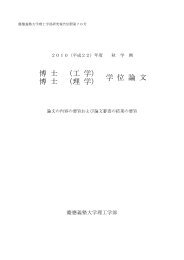Citterio, Daniel - Keio University
Citterio, Daniel - Keio University
Citterio, Daniel - Keio University
You also want an ePaper? Increase the reach of your titles
YUMPU automatically turns print PDFs into web optimized ePapers that Google loves.
Q&A with Associate Professor <strong>Citterio</strong>Q : Why did you choose Japan and what meritsdid you find in working here?A : I chose Japan because I wanted tolead a challenging life as a researcher inan environment with a different culturalbackground. Once settled in Japan, I found thiscountry very favorable for my research activities.First of all, I found it relatively easy to obtainresearch funds. Another merit was easy accessto a network of human connections, which isvitally important for developing research workin this country. In this respect I owe much to myteacher, Professor Suzuki, who is a leading figurein his field and keeps many valuable connectionsin and outside of <strong>Keio</strong>.“Japan as seen from foreign countries;Foreign countries as seen from Japan”Q : When it comes to studying overseas, Japanese students appear ratherreluctant whereas students from other Asian countries are very positive.What do you think?A : According to my observation, Japanese students are also motivated todo so. Given the prolonged recession, they tend to become hesitant forfears that the chance of finding employment may be delayed by at leastone year. Some students opt to study abroad only after having securedtheir employment though . . . I’m always trying to take students with meto participate in international conferences. This often turns out successfulbecause such occasions stimulate students’ intellectual appetite and motivate them tostudy overseas.I think that <strong>Keio</strong> <strong>University</strong> is providing its students with sufficient opportunities inthis respect. <strong>Keio</strong> maintains double-degree programs* with some overseas universitiesand an internship collaboration agreement with the Swiss Federal Institute ofTechnology Zurich (ETHZ), my alma mater. Opportunities are not few. The foremostreason for this problem is that students are concerned about employment. This is myimpression.Q : In what ways do you think humanconnections are important in Japan?A : In Japan human relationships amongresearchers are strong and exchange ofinformation among them is relatively open.Though I have no experience of workingin the United States, my impression is thatindividual researchers there are moreinclined to protect their own worlds thanthose in Japan.(*Double-degree program: This program allows astudent to obtain double degrees simultaneouslyfrom <strong>Keio</strong> and an overseas counterpart inagreement if the student has completed aspecified curriculum mutually agreed upon bythe two universities. Currently <strong>Keio</strong> <strong>University</strong>(Faculty and Graduate School of Science andTechnology) maintains such programs withIntergroupe des Ecole Centrale (France) andLund <strong>University</strong> (Sweden).)“Encouragement ofCosmopolitanism”Q : What points do you think are importantfor <strong>Keio</strong> students to develop activities oninternational scenes?A : First and foremost is the ability tocommunicate in English. Suppose youcan communicate fully in English whenparticipating in an international conference,even if you are a master’s course studentyou’ll be able to make a presentation onone-of-a-kind research achievements ofyour own, which gives you great confidenceas a researcher. If you lack the ability tocommunicate in English, especially thatconcerning your own specialty field, thehurdles will remain high. So I’m always tellingmy students to lower the hurdles of languageto begin with.Q : Mr. <strong>Citterio</strong>, you are proficient in Japanese in addition to German (yourmother tongue) and English. Do you have an aptitude you can recommend to<strong>Keio</strong> students?A : To learn Japanese, I began by listening to rinko* sessions held in Japanesein our lab and at seminars. To master technical terminology, listening isparticularly important since good dictionaries are rarely available. As forEnglish, I’d suggest students listen to lectures by overseas researchers. Bymerely listening to lectures in English, you can substantially increase yourknowledge of English technical terms. I’d like them to avail themselves tosuch opportunities as much as possible. This is the way I learned Japanese. SoI can now read theses written by students in Japanese, although I still findit difficult to read more common Japanese sentences as found inmagazines and the like.(*Rinko: Rinko is an occasion wherestudents report on the progress oftheir respective research activities anddiscuss their contents and directions.In some cases, rinko is held to readimported books and original theseswith students taking turns, or to solvefundamental problems.)6


